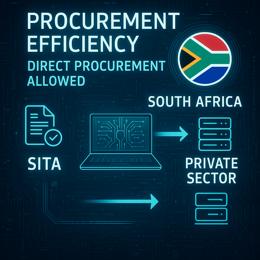Image created by AI
President Ramaphosa Enacts Transformational Public Procurement Law in South Africa
In a landmark move for South African governance, President Cyril Ramaphosa has given his official stamp of approval to the Public Procurement Bill, transforming it into law. This pioneering piece of legislation heralds a new era of public procurement within the nation. The Public Procurement Act is designed to streamline and regulate the purchase of goods and services by all state organs, a process that traditionally has been fraught with inefficiencies and corruption.
Under the provisions of the South African Constitution, specifically Section 217, the government is mandated to procure goods and services in a way that upholds the principles of transparency, fairness, competition, and cost-effectiveness, which the Act is explicitly designed to enforce.
This Act is comprehensive in its scope, applying uniformly to a wide constellation of bodies encompassing departments, constitutional institutions, municipalities, municipal entities, and public entities. Significant also is the fact that certain clauses have been crafted to govern the procurement process within Parliament and provincial legislatures.
One of the most critical dimensions of this new Act is its positioning against corrupt practices. By creating a standardized procurement framework, the Act seals loopholes that previously allowed corruption and state capture to proliferate. The introduction of this legislation comes as a response to the fragmented nature of prior procurement regulations, which were not only confusing but also a fertile ground for the unethical advancement of certain people and businesses.
The Act champions the utilization of technology, which is expected to play a crucial role in ensuring efficiency and effectiveness in the procurement process. Additionally, it aims to further the country's economic objectives by favoring goods produced and services provided within South Africa, aligning procurement with developmental goals.
To maintain the highest standards of integrity, the legislation includes strict criteria regarding who is eligible to submit bids for state contracts. Public office bearers, employees of parliamentary bodies, and officials or employees of public entities are among those barred from bid submission, ensuring a procurement system that operates without conflicts of interest.
The Public Procurement Act is not just a legislative tool but also a vehicle for driving broad economic transformation, aiming to create more egalitarian opportunities for economic participation. With this Act, South Africa takes decisive steps toward revitalizing its public procurement system, with the twin goals of economic stimulation and anti-corruption.
As with all legislation of this stature, effective implementation will be vital. The task falls upon the Minister of Finance to oversee this new procurement landscape, ensuring that the principles laid out in this Act translate into positive real-world outcomes.










